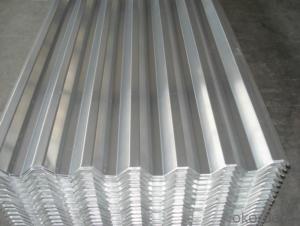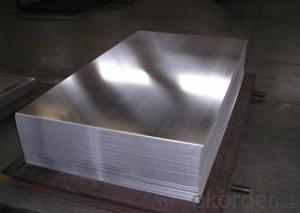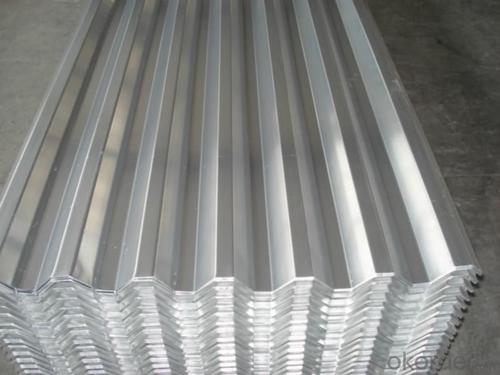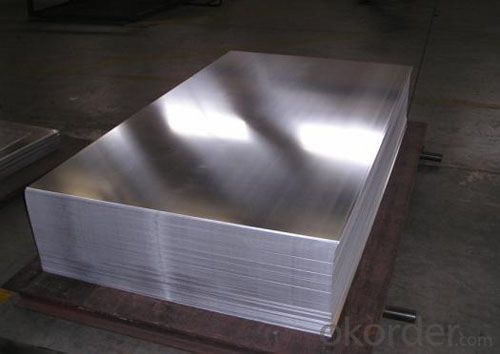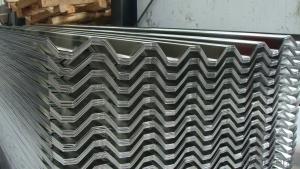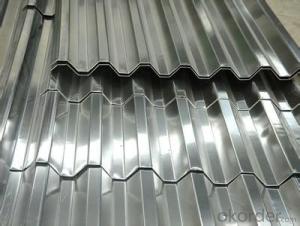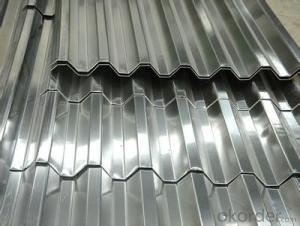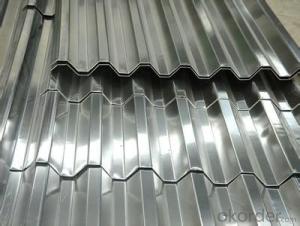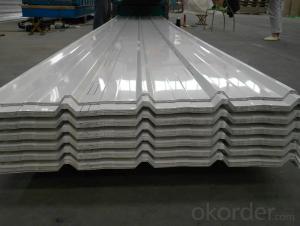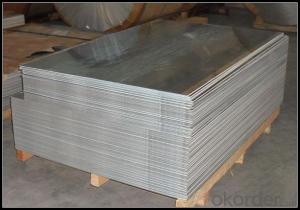Aluminum Trailer Skin Sheets in Different Corrugation Profiles
- Loading Port:
- Shanghai
- Payment Terms:
- TT OR LC
- Min Order Qty:
- 5 m.t.
- Supply Capability:
- 60000 m.t./month
OKorder Service Pledge
OKorder Financial Service
You Might Also Like
Specification
Corrugated Aluminum Sheet in Different Corrugation Profiles
Specifications
Alloy NO. | Thickness | Width | Length | Production line | Circulation size |
1050 1060 1100 3003 | 0.3-9.5mm | 800--2200mm | 1000--10000mm | DC,CC | 1220*2440mm 1250*2500mm 1500*3000mm 1000*2000mm
|
5052 5083 5454 5754 5086 | 0.5-150mm | 800--2200mm | 1000--6000mm | DC | |
6061 | 5-150mm | 800--2200mm | 1000--10000mm | DC | |
7075 | 6-150mm | 800--2200mm | 1000--10000mm | DC | |
Packing | Stick blue film→plastic film→waterproof paper→1~2 tons on a export standard pallet(corner protection) | ||||
Application | decoration:ceilings,walls,furniture,cabinets,elevators,signs,name plate, transportation, cookware, household appliances:refrigerators,microwave ovens, machinery, mold making,aerospace and military aspects, auto, PP cap , construction etc | ||||
Standard | Chemical Composite: GB/T 3190-2008, JIS, EN, ASTM | ||||
Mechanical Property: GB/T 3880.2-2012, JIS, EN, ASTM | |||||
MOQ | 5TONS | ||||
Kind attention | Specifications can be customized as the customer’s requirements | ||||
Application
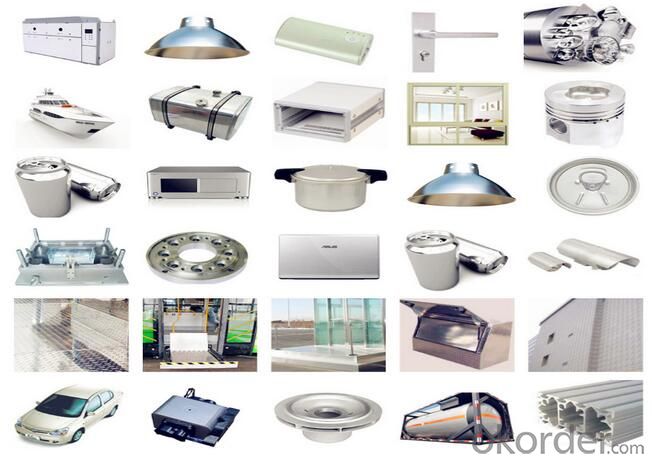
FAQ
Q: Can you provide free samples?
A: Yes, free samples will be sent to you on freight at destination.
Q: Can I get your latest catalogue?
A: Yes, it will be sent to you in no time.
Q: What are your payment terms?
A: We accept L/C, D/A, D/P, T/T, West Union, etc
Q: Can you provide free samples?
A: Yes, free samples will be sent to you on freight at destination.
Q: Can I get your latest catalogue?
A: Yes, it will be sent to you in no time.
Q: What is the MOQ?
A: 5 tons.
- Q: Can aluminum sheet withstand heavy loads?
- Yes, aluminum sheet can withstand heavy loads. Aluminum is known for its high strength-to-weight ratio, making it an excellent choice for applications that require durability and load-bearing capabilities. Aluminum sheets are commonly used in industries such as aerospace, automotive, construction, and marine, where heavy loads are involved. Additionally, aluminum's inherent corrosion resistance further enhances its ability to withstand heavy loads over extended periods. However, it is important to consider the specific grade and thickness of the aluminum sheet, as different alloys and thicknesses have varying load capacities.
- Q: What are the different finishes available for aluminum sheets?
- Aluminum sheets offer a variety of finishes, each possessing unique characteristics and advantages. Some commonly used finishes include: 1. Mill finish: This is the most basic finish, giving aluminum sheets a smooth and shiny surface. It is achieved through the rolling mill process, maintaining the natural appearance. Mill finish is commonly preferred in industrial applications where aesthetics are not a primary concern. 2. Anodized finish: Anodizing involves an electrochemical process that adds an oxide layer to the aluminum sheet, enhancing durability and corrosion resistance. Anodized finishes can range from clear to various colors, and can be dyed to achieve specific shades. 3. Brushed finish: By brushing the aluminum sheet with abrasive materials, a pattern of fine lines is created on the surface, resulting in a distinctive textured appearance. Brushed finishes are often used in architectural and decorative applications. 4. Polished finish: Polishing aluminum sheets involves buffing the surface to a high shine, producing a mirror-like, reflective finish. This finish is commonly chosen for decorative purposes, such as in interior design, automotive detailing, or jewelry making. 5. Embossed finish: Embossing creates raised patterns or designs on the aluminum sheet, adding texture and visual interest. It can be achieved through roll embossing or stamping methods and is commonly used for decorative purposes or to enhance grip in certain applications. 6. Powder-coated finish: Powder coating involves applying a dry powder to the aluminum sheet and then curing it under heat, resulting in a tough, durable, and visually appealing finish. Powder-coated finishes are available in a wide range of colors and offer excellent resistance to fading, chipping, and scratching. These are just a few examples of the diverse finishes available for aluminum sheets. The choice of finish will depend on the specific requirements of the application, including aesthetics, durability, and functionality.
- Q: i m not sure if aluminum hydroxide is a acid or base. if somebody could help me, i will really appreciate.If u can could you also tell me if im wrong or right about the following substances:- pepsi cola is acid- vinegar is a base- ammonia is a base- aluminum hydroxyde is ?thank u for your help.
- The above examples you mentioned are correct. But Aluminium hydroxide is amphoteric. It can behave either like an acid or a base depending on the what it interacts with. It dissolves in acid, forming Al(H2O)63+ or its hydrolysis products. It also dissolves in strong alkali, forming Al(OH)4-.
- Q: You are probably think wtf. Lol, so I just got a Mac and I HATE its keyboard! Also, I have been looking at Fallout 3, and I think its looks amazing! Here is my question: Should I get the new aluminum keyboard for my Mac or Fallout 3? I have $60 to spend and I have found a place to get one or the other for under $60. I could also get on Ebay and get BOTH! Which one/option should I do?
- Keyboard would be more useful and practical. Game would be more fun.
- Q: What are the necessary safety measures to be aware of when handling aluminum sheets?
- <p>When working with aluminum sheets, it's crucial to wear appropriate personal protective equipment (PPE), including gloves to prevent cuts and eye protection to shield against flying debris. Ensure good ventilation to avoid inhaling dust or fumes from cutting or polishing. Use sharp tools to minimize the risk of accidents and always cut away from your body. Keep the work area clean and free of clutter to prevent slips or trips. Be cautious of electrical hazards if using power tools, and ensure all tools are properly grounded. Finally, be aware of the fire hazard potential of aluminum dust and store it safely away from ignition sources.</p>
- Q: Is it possible to use aluminum sheets in environments with low temperatures?
- <p>Yes, aluminum sheets can be used in cold climates. Aluminum has excellent corrosion resistance and maintains its strength in low temperatures, making it suitable for use in cold environments. It does not rust or corrode easily, which is beneficial in harsh weather conditions. However, it's important to consider thermal expansion and contraction, as aluminum expands and contracts more than some other materials. Proper installation and design considerations are necessary to account for these properties in cold climates.</p>
- Q: Is it suitable to use aluminum sheets in outdoor settings where they will be subjected to weather conditions?
- <p>Yes, aluminum sheets can be used for outdoor applications, even when exposed to weathering. Aluminum is a durable and corrosion-resistant material, which makes it suitable for outdoor use. It does not rust like iron or steel and can withstand various weather conditions. However, it's important to use aluminum alloys specifically designed for outdoor use, and to apply protective coatings or finishes to enhance its resistance to weathering and extend its lifespan.</p>
- Q: Are the aluminum sheets suitable for manufacturing window frames?
- Yes, aluminum sheets are suitable for manufacturing window frames. Aluminum is a popular material choice for window frames due to its many advantageous properties. It is lightweight, yet durable, making it easy to install and resistant to corrosion. Aluminum is also highly malleable, allowing for various design possibilities and customization options. Additionally, aluminum window frames offer good thermal performance, excellent noise reduction, and require minimal maintenance. Overall, aluminum sheets are a suitable and reliable choice for manufacturing high-quality window frames.
- Q: How does the thickness of aluminum sheet affect its strength?
- The thickness of an aluminum sheet directly affects its strength. Generally, thicker sheets tend to be stronger and more rigid due to the increased amount of material present. Thicker sheets are capable of withstanding higher loads and are less prone to bending or deformation under stress. However, it is important to note that other factors such as alloy composition and processing techniques also play a significant role in determining the overall strength of an aluminum sheet.
- Q: (given the fact that specific gravity of aluminum is 2.7)1. What is its volume?2. The ingot is suspended from a rope and totally immersed in water. What is the tension in the rope (the apparent weight of the ingot in water)?
- first find the volume of your aluminium. youll need this when analyzing the bouant force F(b). the sg of aluminum is 2.7 and the density of water is 1000 kg/m^3 so the density of aluminum is 2.7x1000=2700kg/m^3. the mass is 71N/g = 7.237512742 kg. so volume of our piece of aluminum = mass/density = 0.0026805603 m^3 now analyze the forces being applied to the system. There are three, the force of gravity F(g), the buoyant force F(b) and the tension T. Tension and buoyant force push up, gravity pulls down. the system will be at rest since the rope is holding it at rest. so T + F(b) - F(g) = 0 T + (Volume aluminum X density water X g) - (MAss of aluminum x g) = 0 T + (0.0026805603x1000x9.81) - (71 N (given in problem)) = 0 Solving for T, T = 44.70370346 N = 45 N using sig figs.
Send your message to us
Aluminum Trailer Skin Sheets in Different Corrugation Profiles
- Loading Port:
- Shanghai
- Payment Terms:
- TT OR LC
- Min Order Qty:
- 5 m.t.
- Supply Capability:
- 60000 m.t./month
OKorder Service Pledge
OKorder Financial Service
Similar products
Hot products
Hot Searches
Related keywords
